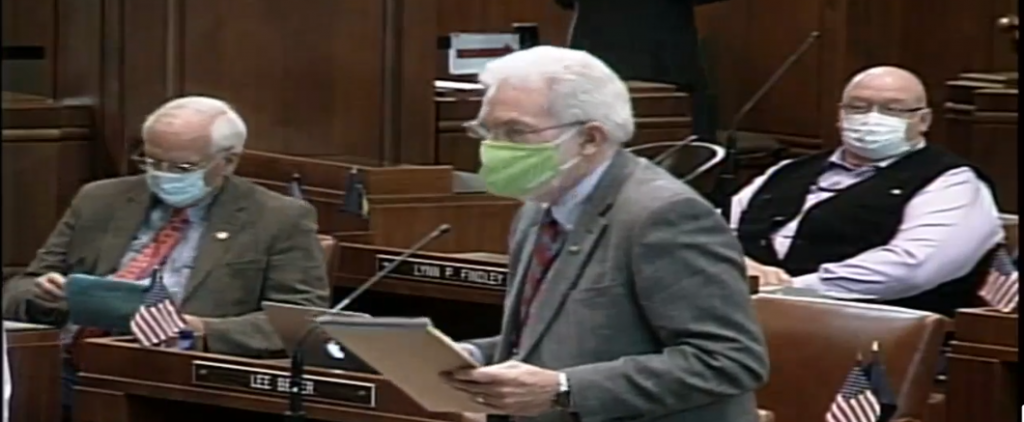March 26, 2021
VICTORY! NFIB Members Rally to Kill PAGA Bill
State Director Anthony Smith reports from Salem on the small-business agenda for the legislative week ending March 26
It’s Day 67 of the 160-day Oregon Legislative Session and the first major bill deadline of 2021 has come and gone. NFIB was tracking about 350 bills prior to the March 19 deadline to post a work session. Now, that bill tracking list is down to about 225 bills. Not all of them were bad, but a considerable number of them were very concerning – and it’s good to have fewer bad bills to worry about.
As a reminder, during a work session a bill can be amended, moved to another committee, or passed out of committee and moved to the floor for a vote. That must occur by the next major deadline, which is Tuesday, April 13. Joint Committees, the Rules Committees, and the Revenue Committees are exempt from this rule, but hundreds more bills will be on the chopping block next month.
Here are the quick highlights of what’s been going on, and what’s coming up, with more information below on each topic:
- PAGA is Dead!: NFIB testified in opposition to HB 2205, the Private Attorneys General Act (PAGA), and deployed a member action alert on the issue. Fortunately, the bill did not survive the March 19 deadline, so this bill is officially dead for the remainder of the 2021 regular session. Thank you for taking action to stop this harmful legislation!
- Taxation of PPP Funds: A surprise amendment to a noncontroversial tax bill was proposed that would treat forgiven Paycheck Protection Program (PPP) funds as taxable income in Oregon. NFIB rallied the business community on short notice to oppose the amendment. The committee chair pulled the bill from the agenda at the start of the hearing.
- Unemployment Insurance Tax Relief: HB 3389 was introduced earlier this week, which seeks to provide short- and long-term unemployment insurance tax relief to Oregon businesses that experienced rate increases due to the pandemic. The bill is scheduled for its first public hearing in the House Committee on Rules on Thursday, April 1.
PAGA is Dead!
Thanks to NFIB members who took action on HB 2205, as well as a huge coalition of employer groups who also reached out to lawmakers, the Private Attorneys General Act (PAGA) bill is officially dead.
PAGA would have allowed individuals (and their own attorneys) the right to sue private businesses in the name of the state for things like OSHA violations and wage claims. It would have opened a floodgate of potentially frivolous lawsuits leaving businesses between a rock and hard place – settle out of court or risk going to trial and still having to pay expensive legal bills.
This bill would have been a disaster for Oregon businesses, especially small businesses that don’t have Human Resources departments or an attorney on staff. It’s dead for now, but we’ll have to remain ever vigilant on this one as I expect we’ll have to fight this battle again in future legislative sessions.
Taxation of PPP Funds
Just one day before a noncontroversial tax bill was scheduled for a work session in the House Committee on Revenue, a surprise amendment was proposed by the committee vice-chair that would treat forgiven Paycheck Protection Program (PPP) funds as taxable income in Oregon.
NFIB discovered the amendment and quickly worked to rally nearly 50 business groups to oppose the amendment and sent the following information to each committee member (Luckily, the chair of the committee ended up deciding to cancel the work session on the bill immediately after the hearing began – it has not been rescheduled… as of yet):
Oppose the -1 Amendments to HB 2457:
A Surprise Tax Increase on Oregon Businesses
The -1 amendments propose a tax on Paycheck Protection Program funds
Background – In response to the COVID-19 pandemic, Congress recognized the financial hardships families and businesses have experienced due to sudden job losses and business closures by passing the CARES Act last year with overwhelming bipartisan support. Among other essential provisions, the CARES Act authorized the creation of the Paycheck Protection Program (PPP), a federal lifeline for both employers and employees that provided temporary and limited funding to businesses in the form of loans that would be fully forgiven if used for authorized purposes like payroll, rent, and utilities.
Kept Employees on Payroll, Off Unemployment – PPP funds were intended to keep as many employees on payroll as possible when states were experiencing massive spikes in unemployment benefit claims due to the pandemic. Congress was clear that these funds should not be considered income, and after the IRS issued a ruling that these funds would not be allowed as regular deductible business expenses, Congress responded by expressly fixing this unintended consequence with the passage of the Consolidated Appropriations Act of 2020.
A Surprise Tax Increase – HB 2457-1 would require that forgiven PPP loan amounts be added back as “taxable income” for Oregon businesses that used the program exactly the way it was intended. It is an unfair, retroactive tax increase on Oregon businesses at time when Oregon is already projected to bring in more revenue than ever before.
Oregon does not need the money – The March State Revenue Forecast was incredibly strong (projecting a $1.74 billion positive ending balance), and we just found out last week that Oregon will receive an additional $2.6 billion in direct financial aid from the Biden Administration’s American Rescue Plan Act of 2021. Given this, there is no budgetary justification for tax increases of any sort, including taxation of forgiven PPP loans.
Protect Oregon Businesses – Oppose the -1 amendments to HB 2457
Unemployment Insurance Tax Relief
Back to some better news… a bipartisan proposal to provide short- and long-term unemployment insurance tax relief to Oregon businesses that experienced rate increases due to the pandemic has been introduced as HB 3389. The chief sponsors on the bill are Rep. Paul Holvey (D-Eugene), Rep. Daniel Bonham (R-The Dalles), Rep. John Lively (D-Springfield), Sen. Bill Hansell (R-Athena), and Sen. Chuck Riley (D-Hillsboro).
The bill provides relief in several ways:
- Turns Back the Clock and Locks in Pre-Pandemic Experience Ratings through 2024: provides that employers’ experience ratings used to determine 2020 unemployment insurance tax rates shall be used to determine rates for 2022, 2023 and 2024.
- Deferral and Forgiveness for 2021 Rate Increases: provides deferral of up to one-third of 2021 unemployment insurance taxes for employers whose tax rates increased by 0.5 percentage points or more from 2020 to 2021 and authorizes forgiveness of percentage of deferrable taxes.
- Keeps Oregon in Lower Overall Tax Schedules by Adjusting Adequacy Ratio: reduces fund adequacy percentages used to determine employer tax rate schedules and extends the look-back period used to determine the Unemployment Compensation Trust Fund solvency level from 10 years to 20 years, while excluding calendar years 2020 and 2021 for purposes of making determinations of solvency level of the fund.
The bill is scheduled for its first public hearing in the House Committee on Rules on Thursday, April 1. NFIB is planning to testify in support of this legislation. It’s a comprehensive approach to a complex problem, but one that we need to get right in order to put Oregon back on the road to economic recovery. We also need to ensure that the fund remains solvent going forward so that Oregon doesn’t end up having to borrow from the federal government like so many other states have already had to do during economic recessions. Additionally, there may be an opportunity to use recently approved federal resources allocated to Oregon in the American Rescue Plan Act to provide further relief from UI tax increases.
Previous Reports and Related News
- January 5—Oregon Legislature Underway–NFIB Monitoring 10 Issues of Immediate Concern
NFIB is a member-driven organization advocating on behalf of small and independent businesses nationwide.
Related Articles



















